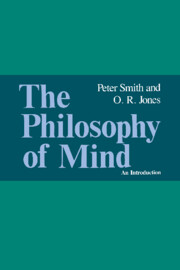Book contents
- Frontmatter
- Contents
- Preface
- Analytical Table of Contents
- PART I Dualism, For and Against
- PART II Towards a Better Theory of the Mind
- VI An Aristotelian Framework
- VII Perception and Sense-Data
- VIII Perception and the Acquisition of Beliefs
- IX Action and Volition
- X Two Theories of Belief
- XI The Function of Beliefs
- XII Functionalism and Folk Psychology
- XIII Assessing the Functionalist Theory
- PART III Sensation, Thought and Freedom
- Chronological Table
- Guide to Further Reading
- Bibliography
- Index
XIII - Assessing the Functionalist Theory
Published online by Cambridge University Press: 27 January 2010
- Frontmatter
- Contents
- Preface
- Analytical Table of Contents
- PART I Dualism, For and Against
- PART II Towards a Better Theory of the Mind
- VI An Aristotelian Framework
- VII Perception and Sense-Data
- VIII Perception and the Acquisition of Beliefs
- IX Action and Volition
- X Two Theories of Belief
- XI The Function of Beliefs
- XII Functionalism and Folk Psychology
- XIII Assessing the Functionalist Theory
- PART III Sensation, Thought and Freedom
- Chronological Table
- Guide to Further Reading
- Bibliography
- Index
Summary
It is time to take stock. Over the last few chapters, the beginnings of a theory of the mind have emerged. We first elucidated the notions of perception and action in terms of the fundamental pair of concepts, belief and desire. We then offered what we called a dispositional/functionalist account of this fundamental pair. Three classes of question now arise. First, how does the view we have arrived at relate to other views in the philosophy of mind? If our position now is (broadly speaking) a kind of functionalism, then how does it relate to all the other ‘isms’ which contemporary philosophers have discussed? Second, can the sort of account which we have offered of the propositional attitudes of belief and desire be extended to cover other sorts of mental state or process? Can we, for example, give an account of sensation or conscious thought which is in the same general spirit? Or does our account need to be augmented by something radically different if it is to cover the whole of our mental life? Third, we must ask about the wider implications of our view: can it accommodate, for example, our ordinary conception of ourselves as free agents?
In short, we must ask about the rivals to our theory, about its coverage and about its implications. In this chapter we will be concerned very largely with the first of these topics. The other topics belong to Part III.
- Type
- Chapter
- Information
- The Philosophy of MindAn Introduction, pp. 177 - 190Publisher: Cambridge University PressPrint publication year: 1986
- 1
- Cited by



